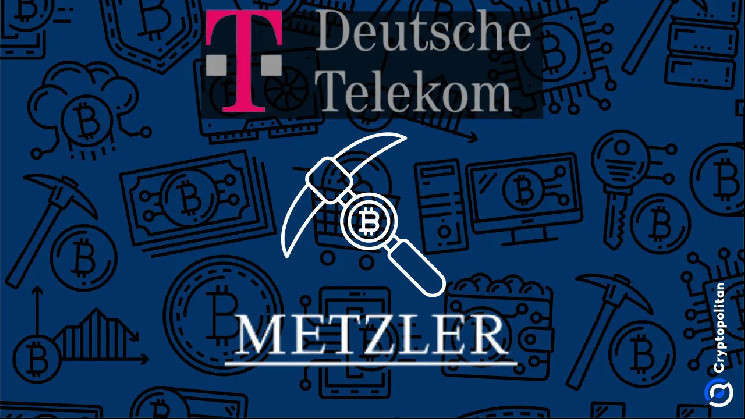MMS, a subsidiary of German telecommunications giant Deutsche Telekom, has entered a partnership with financial services firm Bankhaus Metzler, which will mine Bitcoin using its surplus energy. The pilot project will see both companies use excess renewable energy that would otherwise have gone to waste to mine $BTC.
According to the telecoms company, the project, known as “Digital Monetary Photosynthesis,” seeks to gather sufficient data to support similar projects on a larger scale, ensuring better efficiency in the energy grids.
The project also involves Metis Solutions GmbH, which is the hosting partner, and the mining will take place at the RIVA Engineering GmbH facility in Backnang, Germany.
The company noted that the energy grid needs to be stabilized now that more renewable energy sources are producing surplus electricity. Thus, using Bitcoin mining to regulate power is being considered, particularly because other countries, including the US and Finland, have successfully tried it.
It said:
“With the increasing production of electricity from renewable energy sources, the need to stabilize the energy grid (regulating power) also rises, as production peaks occur irregularly depending on the weather. Particularly through photovoltaic and wind power, there is an increasing amount of surplus energy.”
The official announcement noted that Bitcoin mining will effectively allow energy grid regulation and the balancing of demand and supply in the future. Thus, the long-term goal is to use data from this project to stabilize the energy grid during periods of energy fluctuations.
Telekom MMS explores Web3
Meanwhile, Telekom MMS plans to operate the mining facility based on its previous experience. In partnership with Bankhaus Metzler, it will also define and analyze all test runs and data evaluation. At the same time, Bankhaus Metzler will explore potential use cases for digital assets in financial services.
Speaking on the project, Oliver Nyderle, the Head of Digital Trust & Web3 Infrastructure at Deutsche Telekom, MMS, noted an increasing need for mechanisms that can help regulate energy fluctuations.
The Head of the Digital Assets Office at Bankhaus Metzler, Hendrik König, has a different goal – to gain experience in the applications of blockchain technology.
He said:
“Our goal is to gain experience in various application areas to further advance the innovative power of blockchain technology in Germany. Therefore, we are very pleased to be part of this pilot project with Telekom MMS.”
This is not the first time Telekom MMS will provide blockchain infrastructure services. The company has been providing various services for decentralized networks such as Fetch.ai, Chainlink, and Polygon since 2020 and started operating a blockchain node in 2023.
More traditional institutions embrace Bitcoin mining
While Telekom MMS’s venture into Bitcoin mining is noteworthy, it is not the first time a mainstream company has looked to Bitcoin mining as a way to use excess energy. Leading oil and gas company ExxonMobil was reportedly operating a pilot program using excess natural gas for Bitcoin mining operations as far back as 2022.
The Government of Bhutan also quietly built a substantial crypto-mining business that saw the country generate over 13,000 $BTC through a partnership with Bitdeer. The East Asian country holds its Bitcoin and other crypto holdings through its investment arm, Druk Holdings and Investments, and recently sold around $66 million worth of Bitcoin.
Beyond the economic value, which is the most obvious use case for Bitcoin mining, multiple instances of using Bitcoin mining to provide heating are also emerging. Marathon Digital launched a 2-megawatt mining facility in the Satakunte region of Finland, which warms a town of over 11,000 people using recycled heat from the mining rigs.
 cryptopolitan.com
cryptopolitan.com
